From TikTok trends that unite people around the world to a meme culture marked by an inexplicable sense of humor, Gen Z has reinvented the wheel when it comes to interconnectivity through social media.
This generation has long mastered the use of social media for learning about other cultures, sharing knowledge instantly and connecting with one other, all while transcending barriers of time and distance. However, lost among this digital generation is a different form of connection — the connection to one’s self.
And ironically, social media is once again the solution.
Gen Zers have popularized the use of online personality tests, social media quizzes and even zodiac signs as a medium to further their connection to themselves and the world around them.
Senior Sophia Ramaraju has noticed Gen Z’s tendency to rely on social media to learn more about themselves. “It’s almost like social media forces you to view yourself in a different way, but it’s not really an accurate representation of who you are,” Ramaraju stated.
From online Buzzfeed quizzes to the viral TikTok color test, Gen Z has demonstrated an increased obsession in learning more about their own tendencies through seemingly low-effort measures. But what is the allure of a personality test that matches a pizza topping to your personality or your love language based on your Italian food preferences?
To put it simply, humans have a natural tendency to be understood and find a sense of belonging. We have an innate desire to not only know more about ourselves, but also to be able to describe that understanding in an easy way to others.
While it is true that people are naturally drawn to gaining insight into their unique patterns of thoughts, feelings and behaviors, this quest for self has exacerbated among younger generations, who, despite being active on social media, are experiencing an epidemic of disconnection and social isolation.
What’s even more fitting for Gen Z is that they would rather turn to trivial tests, which provide more personal entertainment than accurate data, than devote time to taking reliable personality tests that actually require personal reflection.
In stark contrast, reliable personality tests like the Myers-Briggs Type Indicator, the Enneagram and the Gretchen-Rubin test have proven to be accurate measures of personal tendencies and behaviors. The questions are a deep-dive into one’s personality: “You are prone to worrying that things will take a turn for the worse,” “You have always been fascinated by the question of what, if anything, happens after death” and “Your emotions control you more than you control them.”
These types of tests, although more tedious to fill out, have grown in popularity, especially as career assessment tools.
With a total of 16 personality types, the Myers-Briggs Type Indicator was derived from Carl Jung’s analytical psychology, created to match users to a job that was best suited for their personality. The test produces a four-letter acronym that reflects the dominant trait along four dichotomies: Extraversion/Introversion, Sensing/Intuition, Thinking/Feeling and Judging/Perceiving.
The Myers-Briggs test is taken online by 1.5 million people each year and has been adopted by more than 88% of the Fortune 500 companies as a part of the hiring process.
Senior Pranav Suresh found that personality tests influenced the way he perceives himself. “After learning that my personality type was INTP, it helped me realize some of the patterns or thought processes that happen. I wouldn’t have thought about how I think if it wasn’t for the tests. It makes me think about why I go into a situation differently than someone else,” Suresh stated.
In a similar fashion, the Enneagram test produces accurate results that are meant to be interpreted by the user as it pertains to them. With the test analyzing qualities such as deepest fears, greatest desires and the user’s “second-wing,” many users have found success in this test, despite its accuracy depending more on the user’s ability to understand the concepts and labels being used.
While such tests are widely used and respected, they are not without their criticisms. Human behavior is too complex to be reduced to a simple categorization with such limiting tests that may result in people seeing themselves in an inaccurate light. However, for many people, taking these tests can provide useful insights into their personality and help guide personal growth like it did for Ramaraju and Suresh.
Despite the accuracy of some tests, they will never satisfy the human desire to be understood. “Sometimes there’s variability to these tests. The more people take them, the more tests people are inclined to take to supposedly learn more about themselves,” Ramaraju continued.
An attempt to satisfy an innate desire to be understood, personality tests — both for entertainment and accuracy—have emerged as a popular way for Gen Z to embark on their search for self.









